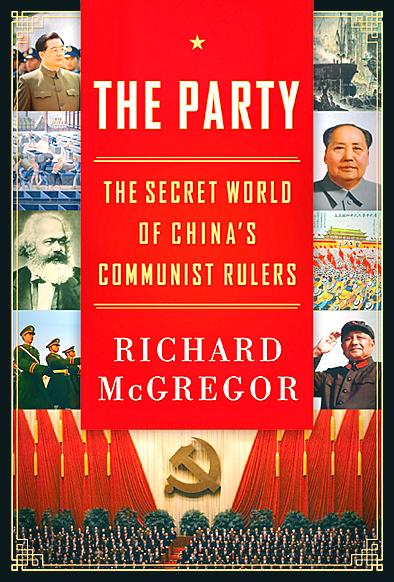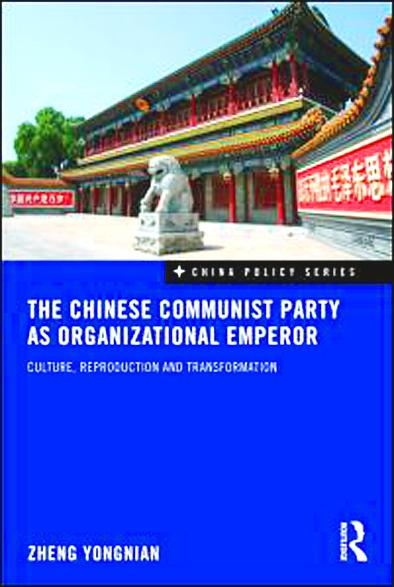The claim that the Chinese Communist Party (CCP) is misunderstood by outsiders has become something of a cliche recently, conferring upon the almost 80-year-old political organization an aura of impenetrability. This dearth of knowledge has slowly been remedied, however, with the publication in recent years of solid studies on the party’s philosophy, modus operandi and ability to defy the odds by remaining in power.
Two new books, The Party, by former Financial Times Beijing bureau chief Richard McGregor, and The Chinese Communist Party as Organizational Emperor, by National University of Singapore professor Zheng Yongnian (鄭永年), make important new contributions to our understanding of this most enigmatic of political parties.
Though targeting very different audiences (McGregor’s style is journalistic, whereas Zheng’s is overly academic), the two works reach similar conclusions as to the CCP’s strategies, conclusions that had already been proposed in David Shambaugh’s China’s Communist Party: Atrophy and Adaptation (reviewed in the Taipei Times on May 11, 2008). The party brooks no organized opposition (what Zheng refers to as a counter-hegemony), does not tolerate the formation of political parties capable of challenging its hold on power, opposes the complete divorcing of party from state, and does not encourage the evolution of democracy as it is understood elsewhere.

This said, the CCP is no monolith, as the two books clearly demonstrate, nor has it failed to comprehend the tremendous challenges that have emerged as the country modernizes and embraces capitalism. The party’s decision to allow capitalists to become CCP members, which Zheng describes as an epochal development in the politics of the past century, is a case in point.
This adaptability, McGregor and Zheng argue, has also had effects on the state’s willingness to use force to repress dissent. Though, in the extreme, the security apparatus will not hesitate to violently quell dissent, the preferred means of oppression have become more refined and subtle, relying instead on intimidation and, with increasing success, co-optation.
Intra-party democracy, or the “accommodation of democratic elements,” which Zheng looks at in more detail than McGregor, is also a product of the CCP’s adaptability and, along with economic growth, probably the key to its survival.

Both authors point to corruption, particularly among the upper ranks of the CCP, as well as unequal distribution of wealth, as posing the greatest risks to state stability and by extension to the party. McGregor and Zheng cite the demise of the Shanghai clique in the mid-1990s and the use of allegations of corruption to bring top officials to heel as examples of how the war on corruption has become intrinsic to factional politics. McGregor’s description of the party apparatus in charge of investigating corruption (and the system that enables officials at the very top to avoid scrutiny) makes for particularly entertaining reading.
While there isn’t anything fundamentally new about the subjects addressed by the two authors, their exploration of the various CCP departments, and how they intersect and interact with the state apparatus, is very helpful, though Zheng’s, which can become so detailed as to name the professors teaching specific classes in the Central Party School, will likely appeal to a very confined group of experts on China.
An interesting point where the two works depart, and what makes them complementary, in a way, is in Zheng’s attempt to portray the CCP not so much as an oddity, but as the product of the society in which it emerged — hence the “reproduction” in the title. Throughout his book, Zheng makes the case that the CCP’s approach to power is contingent on historical continuity and draws from practices implemented back when the country was ruled by emperors. Though this argument could be exploited to make a case against democratization, it nevertheless makes a valid contribution to our understanding of the party’s resistance to Western-style democracy and the ostensible lack of widespread calls for such democracy among ordinary Chinese. Interestingly, we learn that Sun Yat-sen (孫逸仙), the father of the Republic of China, was also opposed to the creation of public associations outside his party and proposed the idea of “partifying the masses” as an alternative to independent social organizations.
Ironically, as Zheng points out, historical continuity, i.e., the reproduction of the organizational emperorship, is also the main driver behind the CCP’s need to adapt and embrace Marxism’s nemeses, such as capitalism and democratic elements, as Chinese history is rife with examples of rigid systems being overthrown by a counter-hegemonic force. As such, to avoid a similar fate, the CCP has no choice but to open up, which in turn empowers other social classes that must be kept in check lest they overturn the system. “As long as the CCP is able to reproduce itself as an organizational emperor,” Zheng concludes, “it is unlikely that China will develop into a Western style of democracy.”
These two works come highly recommended. McGregor’s is easily devoured in a few sessions, while Zheng’s prose, heavy in political jargon and at times repetitive, undermines the book’s readability, and as a result its contribution to our understanding of the CCP is unlikely to reach a mass audience.
For all his nuanced perspective on the Chinese political system, Zheng also makes an incomprehensible slip toward the end, claiming, after indirectly laudatory passages about the emergence of democracy in Taiwan, that democratization characterized by the emergence of a multiparty system in Taiwan has not enabled the country to improve living standards as effectively as China, and led to corruption, “social decay” and “economic chaos.” Coming as it does in the conclusion of his book, this hyperbolic remark hints at a bias against democracy that raises all kinds of unanswered questions about the book’s premise.

Taiwan has next to no political engagement in Myanmar, either with the ruling military junta nor the dozens of armed groups who’ve in the last five years taken over around two-thirds of the nation’s territory in a sprawling, patchwork civil war. But early last month, the leader of one relatively minor Burmese revolutionary faction, General Nerdah Bomya, who is also an alleged war criminal, made a low key visit to Taipei, where he met with a member of President William Lai’s (賴清德) staff, a retired Taiwanese military official and several academics. “I feel like Taiwan is a good example of

March 2 to March 8 Gunfire rang out along the shore of the frontline island of Lieyu (烈嶼) on a foggy afternoon on March 7, 1987. By the time it was over, about 20 unarmed Vietnamese refugees — men, women, elderly and children — were dead. They were hastily buried, followed by decades of silence. Months later, opposition politicians and journalists tried to uncover what had happened, but conflicting accounts only deepened the confusion. One version suggested that government troops had mistakenly killed their own operatives attempting to return home from Vietnam. The military maintained that the

Taipei Mayor Chiang Wan-an (蔣萬安) announced last week a city policy to get businesses to reduce working hours to seven hours per day for employees with children 12 and under at home. The city promised to subsidize 80 percent of the employees’ wage loss. Taipei can do this, since the Celestial Dragon Kingdom (天龍國), as it is sardonically known to the denizens of Taiwan’s less fortunate regions, has an outsize grip on the government budget. Like most subsidies, this will likely have little effect on Taiwan’s catastrophic birth rates, though it may be a relief to the shrinking number of

Since its formation almost 15 years ago, Kaohsiung rock band Elephant Gym (大象體操) has shattered every assumption about contemporary popular music, and their story is now on screen in a documentary titled More Real Than Dreams. It’s an unlikely success story that says a lot about young people in Taiwan — and beyond. For a start, their sound is analog. In the film, guitarist Tell Chang (張凱翔) proudly says: “There is no AI in our sound.” His sister, bass player KT Chang (張凱婷) is the true frontwoman — less for her singing abilities than for her thunderous sound on the instrument. Fast like